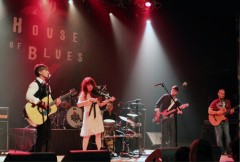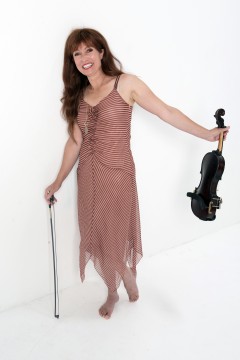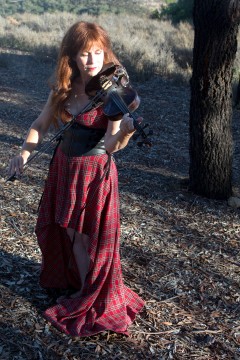Cover Story
Patric Petrie and the Secret to her Success

Patric Petrie. All photos by John Hancock.

Skelpin at the House of Blues



If you were to drive in the western coast of Ireland in the County of Mayo, from the 59 highway you could head west on 319. On 319 you’d go north through the heather and heath, with lakes and rolling hills in the distance. Passing the whitewashed walls of E.T. Sweeney’s roadside garage, you’d pass over the bridge that brings you to The Points, your entryway to the Isle of Achill. You’re traveling west now. A landscape of green upon green lets you know that it’s no lie when they call Ireland the Emerald Isle.
At Bunacurry, you make a right, heading north toward Doorgort. Neat compact houses with large yards rest along the roadway. The asphalt narrows as you pass through a lowland area, with the Doorgort East Bog, a natural heritage area, to your left. That fresh, yet earthy smell lets you know that the bog is close by. As you pass by the bog you’ll make a right onto a narrow paved road not more than the width of a single car. Up ahead, on this flat expanse of Ireland’s northwest, there are a few houses, 16 in all, which make up the town of Dooniver. This is town is where Patric Petrie was born and spent her early childhood.
From this small outpost on the farthest outskirts of Ireland’s northwest, Patric Petrie has gone on to make a big musical mark in her adopted hometown here in San Diego. Distinguished among fiddlers for her beautiful tone, Petrie is also noted for her dynamic stage presence. As a founding member of Skelpin, the award-winning Celtic-World Beat ensemble, she has performed in San Francisco, Seattle, and other major U.S. cities. The band has traveled twice to perform in Tokyo. Perennially nominated in the San Diego Music Awards, Skelpin won the 2010 award for Best World Music Album for their CD A Trip to Skye.
Though she has been in the spotlight and played to thousands, Petrie remains humble when she talks about her music. “A lot of people get into music because they want to be stars,” she says. “But I play music to just play music with people. It’s about the joy. Everybody can make music. You don’t have to be a virtuoso to play. I’ll play with anybody.” The mother of two teenage boys loves the interaction that can be achieved among musicians when they play and says that her biggest skill is her ability to listen. “I love to play with musicians and hear where they are going. Then I play along. And it’s as though the music just comes out of my hands without any thought involved.” Much of this ability comes, as Petrie claims, from the longstanding relationship with her violin, which goes back decades. She knows all the ins and outs of her fiddle. For example, she prefers to play in the lower register, as that is where her instrument sounds its best.
Petrie stands about five foot two. She has reddish auburn hair that flows down to her shoulders and very blue eyes, as you might expect from a Irish native. Her given name is Padraigheen, a name that she shares with her mother and that means “Little Patrick” in Gaelic. Sharing time with her at her Clairemont home, musical ambiance pervades her living room. An upright piano stands against one wall and Django Reinhardt plays on the stereo. Petrie’s two ever-so-large cats, Habibi, which means “beloved” in Arabic, and Saidi share the sofa with Petrie as she pours a couple glasses of red wine.
Petrie has a degree in ancient history from San Diego State, where she also studied Greek and Latin. She also pursued archeology at Cambridge, which entailed performing a dig of an ancient Roman site at Saint Albans, a traditional market town north of London. “I’ve always loved history,” she says. “It was easy for me to choose that area of study in college. And, of course, there’s the saying from George Santayana, ‘Those who do not study history are condemned to repeat it.’” Petrie credits her study of the past with much of the success that she has enjoyed in her life. “One thing I learned from the past was from [Thomas] Edison, that it’s okay to fail. You have to keep trying things in order to find the thing that works. Of course there was Henry the VIII, who had the same approach to finding a wife,” she adds with a laugh.
Both of Petrie’s parents were college instructors. Her mother taught anatomy, and her father specialized in industrial arts, such as welding, refrigeration, and electrical. Petrie credits her parents and their penchant for the academic with instilling in her another great passion in her life: her love of science.
Music became a big part of Petrie’s life when she was very young. “I was three or four years old, but I still remember everything quite clearly,” she says. “My parents must have been embarrassed by this, by what I did. They took me to a symphony, and during the performance I ran up to the stage. I was so excited to be there, and I was fascinated by what I heard and saw.”
Soon after, Petrie remembers her father, a serious man by nature, stopping to have a typically serious talk with his very young daughter. She says, “He asked me if I wanted to play and instrument. When I said that, yes, I wanted an instrument to play, he asked, ‘Which one do you want to play?’ I asked, ‘Which one is the hardest to play?’ I remember my father said, ‘the trombone and the violin.’ So I chose the violin. I’m not sure why I picked the violin over the trombone, but that’s what I chose.”
The four-year-old Petrie started out with a 1/16th-scale violin. Though her parents were not musical themselves, she remembers plenty of time with aunts and uncles who played music and her community being a thriving musical environment. “Everybody played music. It’s a large part of the Irish culture; everybody plays an instrument or joins in with the making of music. Everybody’s welcome. In Ireland there is always a party going on,” Petrie says. The violin became so important to her when she was a child, that as a particularly potent punishment Petrie’s father would threatened to take her violin away from her.
Seeking broader prospects for himself and his children, Petrie’s father decided to make his way in the big wide world and set out with his family for New Zealand. Detouring though the United States, the family stopped in San Diego. It was here that Petrie’s mother stepped in. Falling in love with the sunshine and palm trees of southern California she convinced her husband that San Diego should be the family’s final destination.
Petrie’s father decided that his daughter was going to be the first one in the family to play in a symphony orchestra. Starting about the age of seven her father would lock her in her room for an hour every evening for her to practice. As time passed, however, and Petrie became more and more exposed to the world of classical music, there was much that she found to her displeasure, “I loved the music, but the culture of the classical music world I didn’t like,” she says. “It’s a very different way of teaching and learning. It can be very strict. Teachers berate you. And you have situations where you have concertmasters yelling at their fellow musicians and conductors yelling at the musicians. There are a lot of pressures for the auditions, too. It was not a thing of joy.” At the age of 17 the young Petrie let her father know that she was not going to pursue a life as a symphonic performer.
She put her violin on the shelf and stopped playing, and her father did not speak to her for the next 13 years. “It had become so important to him, to have someone in his family play in an orchestra. It really stung him when I couldn’t go on,” says Petrie. About a year later Petrie picked her fiddle back up when she fell into a group of friends who played mostly folk music. Petrie remembers that the emphasis was on having fun, and her enthusiasm for music returned.
Soon after earning her degree at SDSU, Petrie found work at the San Diego Union. “That’s before it became the Union-Tribune and way before Doug Manchester’s UT,” she says. “I remember that I got off the elevator on the third floor. The Tribune’s offices were to the left and the Union’s offices were to the right. You went one way or the other. There was no mixing. The people who worked at the different papers didn’t talk to each other, almost like the papers were warring camps.”
Petrie worked the night shift as a news assistant, which in the olden days was also called a copy boy. Petrie’s task was “wire walking.” In those pre-cyber, pre-Internet days wire walking entailed scanning the news feed from the Associated Press, which was printed out from a teletype device, and choosing stories for the paper to run in the morning. Among the stories that Petrie remembers pulling off the wire was the story of Andrew Cunanan, the San Diego native who, tragically, went on a killing spree in the late nineties.
She went from there to the San Diego Business Journal, the local weekly that covers general business news, working as the assistant business editor. As a naturally curious person the atmosphere and work at the Business Journal suited Petrie particularly well. Petrie says that if you wind up explaining something to her or telling her a story, she will always ask you to tell her more, then more, and more. Spending five years as assistant business editor she claims that it was this work that taught her more about life than any other experience in her life. “Don’t just dream. That’s what I learned. You have to seize the opportunity,” she says. “You also have to do your homework. You need to know your facts to get anywhere. San Diego is huge with start-ups. At the Business Journal I got to see the ones that worked and the ones that didn’t, and the ones that did their homework and knew their facts were the ones that succeeded.” Petrie has also worked for the San Diego Dental Society, serving as executive director of their charitable foundation. In 2005 she joined the staff of the Carlsbad Business Journal.
Skelpin, the band that Petrie is most closely associated with, goes back to 2000 or 2001. At the time, the Blarney Stone pub sponsored a music session on Tuesday nights, and Petrie often showed up to take part in this Celtic equivalent of a jazz jam session. During these sessions the word got out that there was a new place in the Gaslamp — Dublin Square — and they were looking for bands to play there. Petrie put together a group and tried out for the new spot.
The band didn’t get the gig, but the owner of the Dublin Square wanted to put together an Irish cabaret and approached Petrie with the idea of taking part in the project. The cabaret tuned into a great success and included Liam Harvey, who was one of the performers with Riverdance, the world-famous stage production that celebrates the tradition of Irish step dancing.
Out of this cabaret experience grew Skelpin. Though the roots are Irish, right from the start Skelpin incorporated music and rhythms that had roots far from the land of Saint Patrick and shamrocks. The name of the band itself, which means, in Irish, a swift slap to the head, describes the band’s approach to roots and traditional music, giving the musical traditions a whack or two to keep Celtic music vibrant and alive and not letting it become a relic or a museum piece.
The band embraced Rowshan Dowtlabadi. Azerbaijani born, the accordionist and percussionist incorporated his Caucasian music and the Middle Eastern music he picked up while he lived in Istanbul into his work with Skelpin. The Maldonado brothers — guitarist David and percussionist Hector — performed with Skelpin for years and brought the fiery and passionate sounds of flamenco to the band.
As Skelpin relies on the backgrounds of the various band members, the band’s world-beat sound comes off as organic. There is no effort to claw-hammer the differing threads and influences together. The musicians let their influences flow from them; then they see what happens in the resulting Irish stew/masala of music. Currently the band features Petrie on vocals and fiddle, San Diego guitar slinger Jimmy Patton, Tim Foley on vocals, guitar, uilleann pipes, and wind instruments, Enrique Platas on drums and percussion, and Wesley Forsberg plays bass.
“Not only have we found incredible musicians to perform with us, we were so ahead of the game when it came to doing the business of music,” Petrie says. It started with booking gigs, not allowing themselves to be low-balled into accepting less for gigs than what the band was worth. This paid off and opened up opportunities for the band to perform at high profile functions for such corporations as Microsoft and Mapquest. They also received a great deal of bookings at Irish music festivals. Petrie and the rest of the band also took advantage of opportunities as they came along. Playing a festival, Petrie noticed that the program for the event had a blank page, a large platform for advertising that was unused. Petrie bought an ad for the band and filled the space in the program. Weeks later, a representative from Disney, who had not heard the band but had seen the ad, contacted Skelpin asking if they could play at the Disneyland in Japan.
“Playing in Japan was beyond a thrill,” says Petrie. “Put me in a foreign country and as long as nobody’s shooting at me, it’s great.” Petrie and the rest of the band were with Disney, which had English-speaking employees who worked with the band during the day. But when the band was taken back to their housing in the evening, they were on their own. “None of us could speak Japanese! We’d go into the grocery store and have no idea of what was on the shelves. This over here has a baby picture on it. Is it baby food? And we were there for five weeks! I remember saying that I hate this shampoo. It turned out to be dishwashing liquid!”
Frustrations aside, the whole experience of performing in Japan proved to be a positive one for the band. Petrie says, “The Japanese people are amazing. Night after night the same people would come to our shows. We were told that that is one way the Japanese will convey a compliment — to return to see a performance again.” In 2007 Skelpin returned to Japan for the annual Irish Music Festival. (Yes, Tokyo has Annual Irish Music Festival.) The band even got a place marching in Tokyo’s Saint Patrick’s Day Parade. (Yes, Tokyo also has a Saint Patrick’s Day Parade.)
Skelpin, as their name implies, is a high-energy endeavor, which led Petrie to embark on her recent solo CD release, Pocket Venus (reviewed in the August issue of the Troubadour). She has had a number of slower tunes she enjoys performing some of the old standards, such as “Sally Garden” and “Star of the County Down,” which are not part of Skelpin’s repertoire. Petrie wanted a venue for these chestnuts and making this sort of recording was something that Alan Sanderson, who had produced Skelpin’s previous CDs, had pushed Petrie to undertake for a long time. The entire disk draws on Celtic, French, Gypsy jazz, even a little Irish steampunk. Petrie chose to call the recording Pocket Venus because the term refers to a diminutive yet curvy woman. As I said before, Petrie stands about five-foot two. Seems pretty apt if you ask me.
Petrie never earned a chair with a symphony orchestra, but another great musical accomplishment, performing with the Chieftains, became the catalyst for renewing her relationship with her father. The story of her appearance with the Chieftains is one that crosses both her musical career and writing career. Petrie interviewed Paddy Malone of the Irish super group for the Business Journal. After the interview, Malone invited Petrie to the show and told her to bring her fiddle. “I thought we’d just have a bit of a session after their show,” says Petrie. “But when I got to the gig, their manager hissed at me, telling me I was late. I got shoved onto stage during the show. Pretty soon Paddy announced I was a guest performer and was going to do a solo, which all came as rather a surprise to me! Fortunately, after I started playing the band jumped in and joined me. So I can honestly say I’ve been backed up by the Chieftains!” After learning of his daughter’s performance, the ice began to melt in Petrie’s relationship with her father.
Currently, Petrie’s day gig is working at SPAWAR, a division of the Navy that is charged with maintaining and developing super-duper high-tech communications systems. Her job is to take what scientists do and talk about and translate that lingo into English that can be understood by naval managers and the public. When she’s not touring or performing with Skelpin, she plays with David Lally, a singer-songwriter from Galway, almost every week in North County. Petrie says, “David introduced me to all sorts of [musical] things like Radiohead. He gets me listening to more mainstream music than what I’m familiar with.” The duo performs at the O’Sullivan’s in Escondido and the O’Sullivan’s in Carlsbad, generally bouncing back and forth from one to the other week by week.
As we wrap up our talk, our glasses of wine now emptied, Petrie becomes a bit reflective. “I was at Mass this past Sunday,” she says. “And the sermon was on Jesus’ parable about the talents, about the three men given the coins and each goes out. One brings back all the money he’d accumulated and the one who buried his talent brings back a single coin. Hearing that parable, I realized that God gives us so much and how blessed I’ve been. I’ve been truly blessed.”










